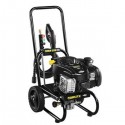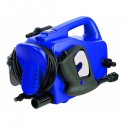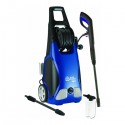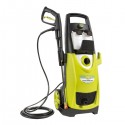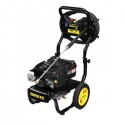Best Residential Pressure Washer
These are the 10 best residential pressure washers based on product quality, customer satisfaction, and price:
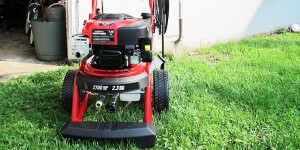 A residential pressure washer is one of the most useful tools you can buy for your home. There is really no other machine that is going to have the kind of versatility in terms of different applications that a residential pressure washer does. All of your other tools are going to be highly specialized, and have one or maybe two uses at best. A residential pressure washer, by contrast, has literally dozens of uses around the house, and there is virtually no job too big or too small for it. You can use most residential pressure washers inside and outside of the home, and in your garage and garden as well.
A residential pressure washer is one of the most useful tools you can buy for your home. There is really no other machine that is going to have the kind of versatility in terms of different applications that a residential pressure washer does. All of your other tools are going to be highly specialized, and have one or maybe two uses at best. A residential pressure washer, by contrast, has literally dozens of uses around the house, and there is virtually no job too big or too small for it. You can use most residential pressure washers inside and outside of the home, and in your garage and garden as well.
There is no limit to the number of cleanup jobs you can use a residential pressure washer for, and once you start thinking outside the box you will really start to be amazed by how many different applications you will be able to find for it. One of these machines can keep your second story windows sparkling and clear with just a few spray washes a year. You can remove unsightly mold and grime from the aluminum or vinyl siding on your house in minutes and have it looking brand new again. Give your deck a good power washing and it will be looking like it did the day you first coated it in protective stain.
In the yard, turn your residential pressure washer on you grill to blast off years of grease and grit and have it as clean as the day you brought it home. You can clean off lawn furniture in minutes and spray garbage cans so that they are free of smelly stains. And you can use your residential pressure washer to keep your garden tools and the cutting deck on your lawn mower free from mud and grass clippings.
You can wash down a concrete driveway with your residential pressure washer, blasting oil stains out by combining the water with a chemical solvent using a convenient intake hose or onboard detergent reservoir. And you will never have to take your SUV to a car wash again – you can use your residential pressure washer to get a professional looking sheen on it in minutes.
Now, how do you figure out which pressure washer is the best one? It can seem like a daunting challenge – there are so many different models, with varying accessories, PSIs, designs and prices. You want to be sure you are getting the very best model for your needs, and you absolutely do not want to wind up spending what can be a good deal of money just to wind up with a piece of junk.
Well, it turns out that it is actually pretty simple. There are a few very basic characteristics that the best residential pressure washers will have. Simply narrow down your search based on these criteria, and soon you will have a very short list indeed. At that point, choosing the best residential pressure washer will be easy.
1. Best Residential Pressure Washer Characteristics
1a. Great Cleaning Power Rating
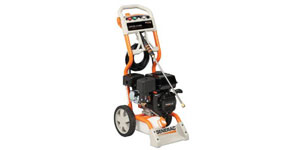 The cleaning power rating is always going to be the most important thing to look at whenever you are in the market for any new pressure washer, and it certainly is for residential pressure washers as well. The cleaning power rating indicates just how quickly and efficiently a residential pressure washer will be able to blast through serious dirt and grime, as well as how well it will handle a big job. But just what is the cleaning power rating, and how is it calculated?
The cleaning power rating is always going to be the most important thing to look at whenever you are in the market for any new pressure washer, and it certainly is for residential pressure washers as well. The cleaning power rating indicates just how quickly and efficiently a residential pressure washer will be able to blast through serious dirt and grime, as well as how well it will handle a big job. But just what is the cleaning power rating, and how is it calculated?
Well, there are two components to it – the pressure and flow rate. Pressure is measured in Pounds per Square Inch, or PSI, and flow rate is measured in Gallons per Minute, or GPM. The pressure on most residential pressure washers is anywhere between 1500 and 2500 PSI, with most units having PSIs that fall somewhere around 1800. The flow rate on residential pressure washers is usually somewhere between 1.2 and 1.5 GPM. In order to calculate the cleaning power rating, you simply have to multiply the Pounds per Square Inch by the Gallons per Minute. The result allows you to compare residential pressure washers with different pressures and flow rates based on uniform criteria.
So a residential pressure washer with a pressure of 1600 PSI and a flow rate of 1.5 GPM may seem like it does not have the same power as a model with a pressure of 1900 PSI and a flow rate of 1.2 GPM. But if you do a little math, you will see that the first one has a total cleaning power rating of 2400 while the second only has a cleaning power rating of 2280. But why is this important?
It is because the residential pressure washer with the higher cleaning power rating will be able to provide its maximum pressure while maintaining a spray of water that has a larger diameter than the one with the lower cleaning power rating. Sure, higher pressure means it will be able to blast through dirt more powerfully, but if it does not have the necessary flow rate, it is only going to be producing a pencil thin spray of water.
As a result you may have to spend a lot more time cleaning off the same area, even though you are using the residential pressure washer with the higher PSI. So: always go for the pressure washer that has the highest cleaning power rating, not just the highest PSI.
1b. A Small Package
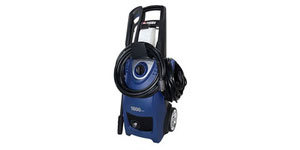 If you are at all like me, your garage is probably bursting at the seams with all of the different yard and garden tools you have in there. Between my lawn mower, snow blower, and all of the different wheelbarrows, planters, fertilizer and seed – not to mention all of my garden tools – there is already barely enough room in my garage for my car. So I certainly do not want to be buying any new home and garden appliances that are going to have the kind of massive footprints that take up way too much space in my garage. And neither should you.
If you are at all like me, your garage is probably bursting at the seams with all of the different yard and garden tools you have in there. Between my lawn mower, snow blower, and all of the different wheelbarrows, planters, fertilizer and seed – not to mention all of my garden tools – there is already barely enough room in my garage for my car. So I certainly do not want to be buying any new home and garden appliances that are going to have the kind of massive footprints that take up way too much space in my garage. And neither should you.
There are a few very good reasons for this. The first is outlined above: space is at a premium, and you do not want a residential pressure washer that you cannot fit in your garage or tool shed. But a bulky pressure washer is also going to be more difficult to use. It is going to be harder to maneuver around the yard or in and out of your house, and it may be top heavy, which will leave it prone to tipping over – and if it is made of plastic and does not have a roll cage, then it is in danger of breaking.
But you also can tell a lot about the quality of engineering that went into designing a machine if it provides the same PSI and flow rate as another model but needs a much bigger footprint to do so. The residential pressure washer should be designed so that it is sleek and compact, not overwrought and bulky. When it is compact, and still packs a lot of cleaning power into that small space, you know that a lot of thought went into making sure the best and most efficient parts were used in making it.
Furthermore, bulkier residential pressure washers are often going to be a lot heavier than compactly designed ones, for many of the same reasons. While this is also indicative of poor design and engineering, it also makes the pressure washer a big hassle to use. If you are not a person with a whole lot of upper body strength, trying to negotiate a heavy pressure washer around the yard – or worse, carrying it up your porch stairs to get it into your house – is going to be very difficult, and may leave you aching. So find the best residential pressure washer with the smallest footprint.
1c. The Right Power Source
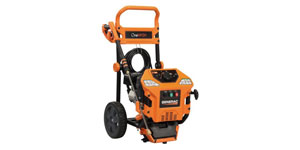 It is important to figure out what power source will provide the best fit for your particular needs when you are narrowing down your short list of the best residential pressure washers. There are two options: you can rely on electric power or buy a machine that runs on regular gas. Which one you decide to go with will depend on a number of things, including your personal preferences, the kind of work you intend to use the residential pressure washer in, and whether you are in a state that enforces California Air Resources Board regulations governing small engine emissions.
It is important to figure out what power source will provide the best fit for your particular needs when you are narrowing down your short list of the best residential pressure washers. There are two options: you can rely on electric power or buy a machine that runs on regular gas. Which one you decide to go with will depend on a number of things, including your personal preferences, the kind of work you intend to use the residential pressure washer in, and whether you are in a state that enforces California Air Resources Board regulations governing small engine emissions.
There are advantages and drawbacks to both power sources, so this is a decision that you should think about rather carefully before you decide to go with one or the other. We will start with gas engines. These are definitely able to provide more power than their electric counterparts, and that certainly has its advantages. Gas powered residential pressure washers are able to support higher pressures and flow rates than electric models can. They also have the distinct advantage – unique to gas powered pressure washers – of being able to provide hot water as well as cold water sprays. They can provide sprays that are as much as 180 degrees Fahrenheit, which will be able to literally dissolve tough dirt and grime much more quickly than cold water sprays can.
But gas residential pressure washers are much nosier than electric models, more expensive to run and maintain, and produce lots of emissions. Electric residential pressure washers run almost silently, and they produce zero emissions at the point of use. This has several advantages. First of all, by going with the cleaner energy option, you will be able to reduce your household’s overall carbon footprint significantly, especially if you are using your residential pressure washer for a lot of different cleaning jobs (and you should be!).
But when you do not have to worry about emissions, you also never have to consider whether your residential pressure washer is compliant with CARB small engine emissions standards. This is something you can’t do with many gas powered pressure washers. Furthermore, if you are using your residential pressure washer in an enclosed space, you do not want it to be giving off harmful fumes that can cause respiratory problems.
So as you can see, this is a category in which “best” depends on a number of factors that you will have to determine yourself.
1d. Lots of Accessories
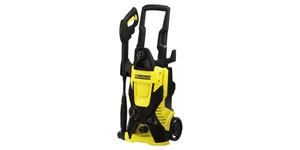 On any new appliance or home and garden machine, you want to have a lot of accessories that are designed to improve the overall experience of using it, and when you are looking for the best residential pressure washer this is no exception. Just about any residential pressure washer can offer high PSI and flow rates, build it into a durable, highly compact package and call it a day. And while those machines will certainly perform well, and tackle lots of varied and tough cleaning jobs, they may not be particularly enjoyable to use. For that, you need a machine that has excellent design notes and convenient accessories.
On any new appliance or home and garden machine, you want to have a lot of accessories that are designed to improve the overall experience of using it, and when you are looking for the best residential pressure washer this is no exception. Just about any residential pressure washer can offer high PSI and flow rates, build it into a durable, highly compact package and call it a day. And while those machines will certainly perform well, and tackle lots of varied and tough cleaning jobs, they may not be particularly enjoyable to use. For that, you need a machine that has excellent design notes and convenient accessories.
Let’s start with the spray wand. When you have a residential pressure washer with a high PSI and flow rate (and you should), one of the advantages this gives you is the fact that you have a wide range of cleaning power options to choose from. If you are blasting dried mud and grass clippings off of the cutting deck of your lawn mower, you want to be able to set your residential pressure washer to a high cleaning power setting. But if you are rinsing off windows or washing your car, you want to be able to dial that PSI down considerably so you do not risk breaking them or taking the finish off. So your residential pressure washer should come equipped with at least five or six nozzles for setting different pressures.
Next: while you may not be purchasing a gas residential pressure washer that can provide a scalding hot water spray to blast through tough dirt and grease that is no reason your machine should have any problem handling these types of stains. What you can look for is a pressure washer that has a soap or detergent intake so you can combine tough chemical solvents with the spray. Even better is if the pressure washer that has an onboard detergent reservoir.
It goes without saying that the hose (and power cord, if it’s electric) should be long – at least 20 to 25 feet long. You want a range of motion around the pressure washer so you don’t have to be dragging it along with you everywhere you go. There should be convenient onboard storage for the hose. And when you are moving the pressure washer around, it should be made easier by big pneumatic tires that provide excellent traction on wet, slippery ground.
1e. Competitive Pricing
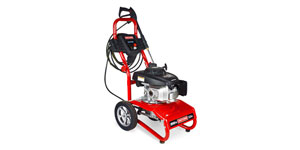 Finally, once you have narrowed down your short list of the best residential pressure washers to three or four of the truly excellent models – those that have the highest pressures and flow rates and highly effective pumps contained in small, lightweight packages, with the best accessories and driven by the power source that makes the most sense for your needs – it is time to consider the price range. How much you are willing to spend is going to have a rather significant effect on what kinds of pressure washers you are looking at. Not only that, but it will determine to some degree what the ceiling is for PSI and flow rate, and machines that are well designed and have lots of convenient accessories are often going to cost a bit more.
Finally, once you have narrowed down your short list of the best residential pressure washers to three or four of the truly excellent models – those that have the highest pressures and flow rates and highly effective pumps contained in small, lightweight packages, with the best accessories and driven by the power source that makes the most sense for your needs – it is time to consider the price range. How much you are willing to spend is going to have a rather significant effect on what kinds of pressure washers you are looking at. Not only that, but it will determine to some degree what the ceiling is for PSI and flow rate, and machines that are well designed and have lots of convenient accessories are often going to cost a bit more.
But a word to the wise: this does not mean that you should simply go out and buy the most expensive residential pressure washer on your short list. In fact, this is almost the opposite of what you should do. Never shop for any appliance or tool based solely on price – and that goes whether you are looking for the cheapest or the most expensive one. If you do this, you are going to be throwing money away every time. Either you will waste money by buying a residential pressure washer that is just overpriced, or you will buy a cheap piece of junk that may save you money up front but will just have to be replaced or need costly repairs in a year or two.
The truly savvy consumer knows that in any product market, the best value for the dollar is going to be in the products that have price tags that fall somewhere in the middle of the price range. Those residential pressure washers that are more expensive than the cheapest ones on the market are probably going to have higher PSIs and flow rates, and be made of more durable materials that will last longer and provide better performance over the long term than the inexpensive ones. But once you move beyond the moderately priced residential pressure washers, you wind up looking at models that do not offer a whole lot more in terms of PSI or flow rate, and simply cost a lot more money.
So shop smart. Narrow down your list based on the important criteria, and only then look at price. Don’t buy the cheapest residential pressure washer, and don’t buy the most expensive one, either.
2. Best Residential Pressure Washer Reviews
Simpson MSH3125-S 




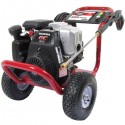
The Simpson MSH3125-S has the kind of powerful engine and sleek design that will make it easy to take care of lots of different tasks with it – so easy, in fact, that you may find yourself wishing there were more chores around the house that you could use it to take care of quickly [...]
Karcher K5.85 M Plus 




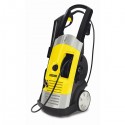
Karcher K5.85M Plus is the kind of superior residential pressure washer that you will certainly want to purchase if you have lots of big cleanup jobs to take care of around the house. As soon as you get it out of the box, it will be pretty obvious that this is a pressure washer that [...]
Karcher K3.540 




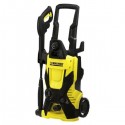
Karcher K3.540 is one of the only pressure washers to feature a completely unique, patented water-cooled induction motor that allows for better overall performance and a much longer life. The pump powers a direct-drive pump that delivers superior pressure and never needs maintenance to keep it running smoothly. The Karcher K3.540 comes with two spray [...]
Karcher K5.540 




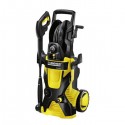
The Karcher K5.540 is designed to provide high performance and serious power in a small, lightweight package. It is convenient and very easy to use, and it has a number of excellent accessories designed for this purpose. It comes with multiple wands for tackling different kinds of jobs, an onboard detergent reservoir, and a Quick [...]
AR Blue Clean AR142P 




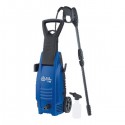
AR Blue Clean AR142P is an electric pressure washer with lots of cleaning power and a number of other excellent advantages. Unlike a gas powered residential pressure washer, the AR Blue Clean AR142P is never going to need an oil change or tune-up, and you will not have to keep smelly gas cans in your [...]
These are the 10 best residential pressure washers based on product quality, customer satisfaction, and price:

